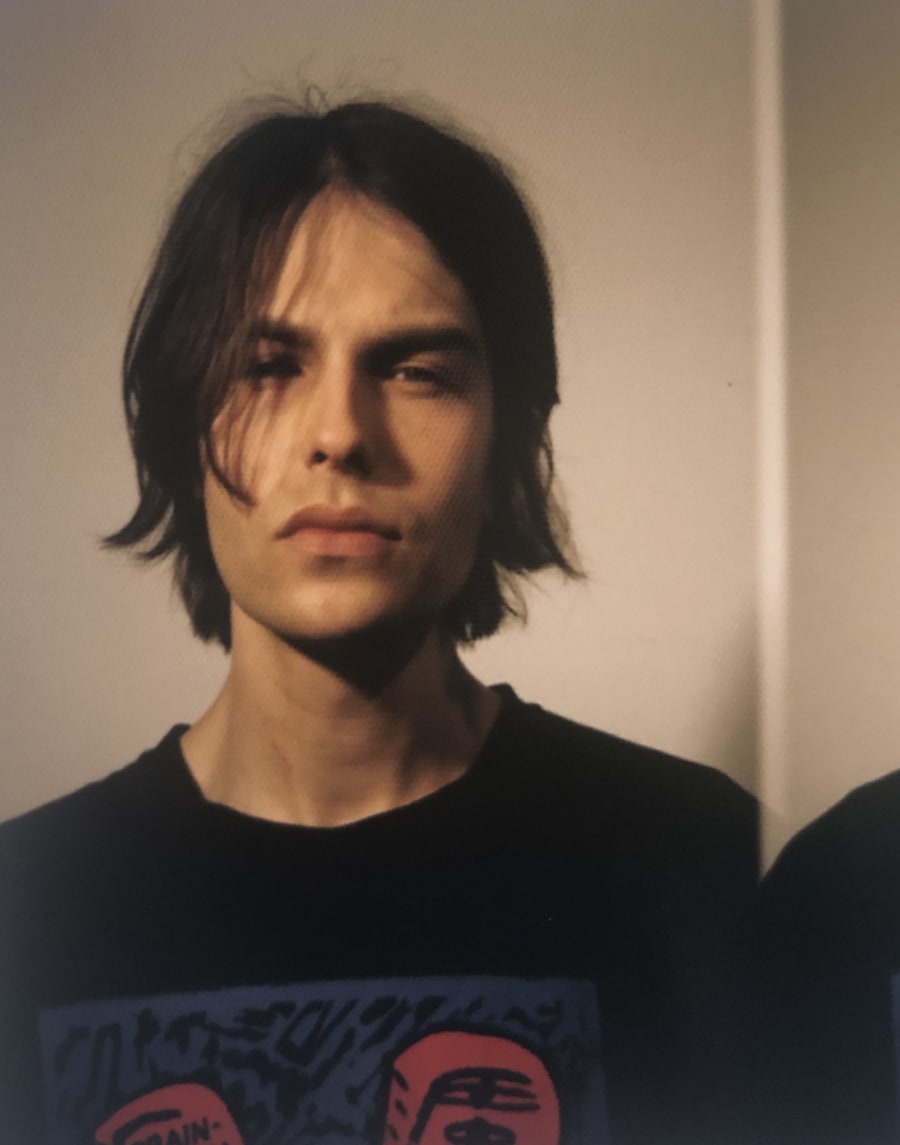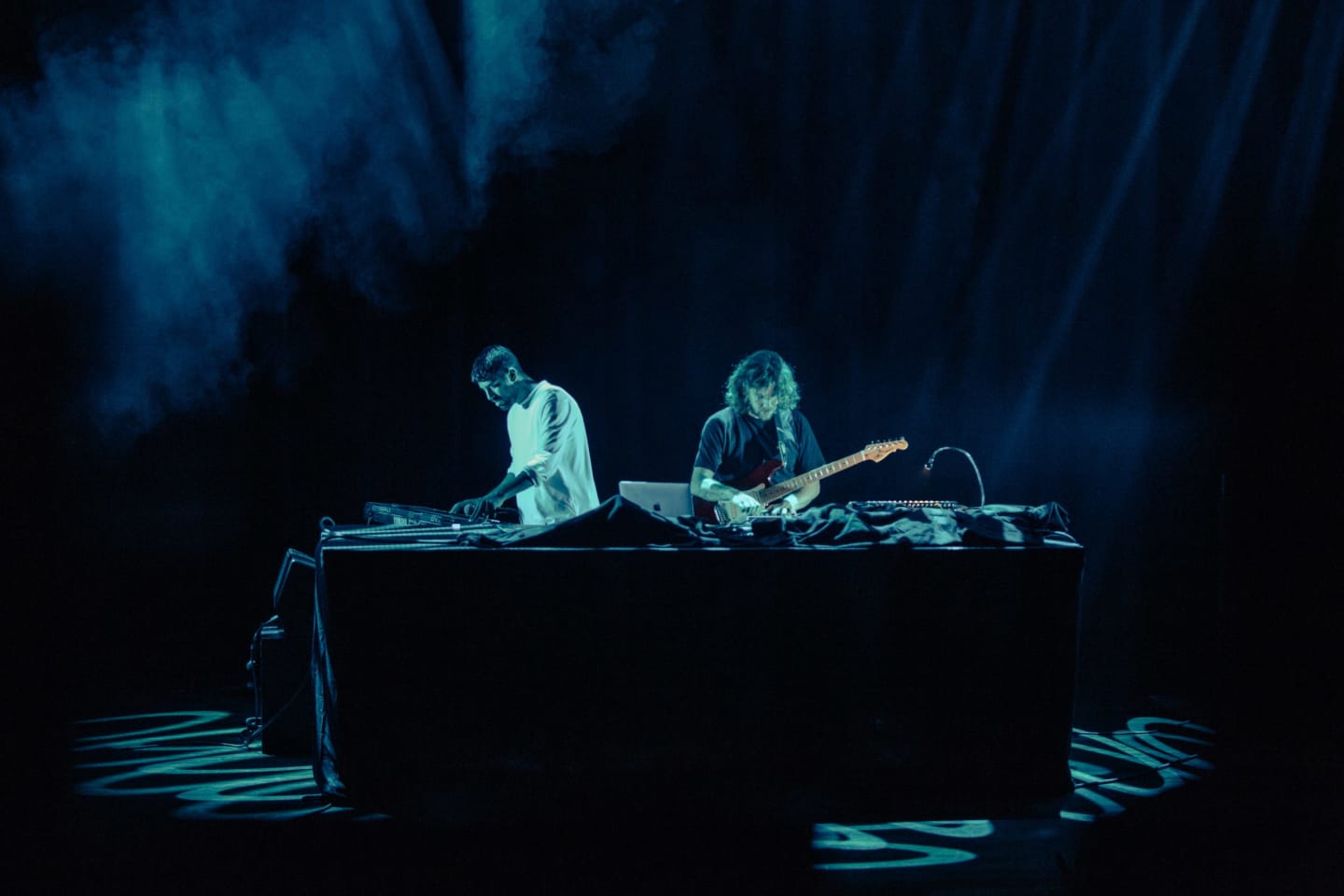The article you’re reading comes from our archive. Please keep in mind that it might not fully reflect current views or trends.

The Summer of Synth Pop: Producers Go Analog in Brief Farewell To the Dance Floor
“Are people in pain where you are?” When British producer Nathan Jenkins (A.K.A. Bullion) penned the lyrics to “Hula,” he couldn’t have known how prescient these words would be. Released in February this year, Bullion’s latest EP We Had A Good Time is essentially his swan song to the clubbing days after the smash success of 2017’s shanty-house banger “Blue Pedro” and subsequently developing tinnitus— a condition that led him to leave London in search of a more quiet life in Lisbon. On the titular track “We Had A Good Time,” he makes generous use of guitars, synth pads, reverb, and even the sound of thunderstorms crashing to craft a pop anthem that aims straight to the heart (and even earned him a co-sign from Oneohtrix Point Never)–a “damn near perfect” song suitable for romanticizing memories like the rush of a new entanglement before it vaporised into thin air. What makes We Had A Good Time particularly striking though is that it’s not just a breakup song in the romantic sense, but that it also represents the breakup of a life once spent on dance floors. A past that one can’t quite return to, at least not anytime soon.
One month after its release, with a global pandemic in full swing, We Had A Good Time’s themes of nostalgia and bittersweet memories of times past suddenly felt eerily poignant. By the time summer rolled around, staying up all night and returning home in broad daylight had been replaced by staring at one’s phone screen, reminiscing about the halcyon days of yesteryear. We’re only six months into this “strange and unprecedented” new reality, and already people have adopted referring to life before March as “the Before Times”. Meanwhile, archived footage of formative raves and festivals have continued to flood our feeds, increasingly leaving a bittersweet aftertaste with each event’s passing anniversary.
Accordingly, a handful of records released this year have tapped right into this feeling. In May, Danish musician Natal Zaks, who produced Erika De Casier’s debut album Essentials, announced his sophomore album Alletiders under his indie pop alias Alle. “I didn’t really imagine writing love songs and singing, but through the years, I’ve been intrigued by the idea of ‘no stone left unturned’ in a musical sense,” he says. Instead of leaning on the off-kilter house and breakbeat sounds he’s come to be known for as DJ Central and with his cult house label Regelbau, Alletiders takes a mellow approach to synth pop, with playful lyrics in his native language. “I often think about [Alletiders] as children’s music, uncomplicated and awkwardly honest,” he says.

RIP Swirl’s aptly titled Hope U Are Well, released on Public Possession at the peak of spring lockdown in Berlin, saw another electronic producer and DJ pick up the guitar from his indie band years, strumming it bleakly on tracks like “Antisocial” and “Spring Break II.” The record also features vocals by Catnapp and frequent collaborator Sofie, the Stones Throw associate who quietly released her own synth-pop album Cult Survivor via the LA label in June.
“Having finished the announcement for RIP Swirl’s first EP that was out late last year, titled 9Teen90, with the words: ‘A better life starts here’… we now find ourselves in a situation where we might have given a slightly off prognosis,” the writeup from Public Possession admits. If there’s one thing that RIP Swirl’s body of work hits on most accurately, though, it’s the strange sense of sentimentality that accompanies adolescence. Parallel to the release of Hope U Are Well, a meme circulated online describing the ways in which electronic music fans in quarantine have spent as much of their time: grounded, playing video games, smoking weed, experimenting with various hairstyles, and living at home with their parents as they did when they were teenagers.


For London producer E.M.M.A., who fled the city to stay with her parents at the start of the pandemic, the latter certainly rings true. “I’ve been listening to quite a lot of music from 2003, the summer I finished the main part of high school,” she says. “I bought some scented gel pens and a journal, and I’ve been playing tennis with a friend from my school I haven’t seen in years.” She says this backwards shift “has also been nice,” in the sense that it’s allowed her to meditate “on what I know now that I didn’t know then–what advice I would give my younger self with the benefit of life experience.”
Her sophomore album Indigo Dream, released on Local Action in July, is full of ’80s-inspired synth melodies and cinematic breakdowns. The lead track “Into Indigo” opens dramatically with the sound of a rumbling thunderstorm. On “Ryan Gosling in Space,” waves come crashing in before the slow burn of a rolling kick drum unfolds. Listening to it, it called to mind the emotional intensity of Timbaland’s beat layering on Justin Timberlake’s “Cry Me a River,”–a formative anthem for many Millennials that samples natural sounds like breath, snaps, and rain fall. Some of the album’s nine tracks date back all the way back to demos made in 2015. “When I finished the album, I knew nothing of the forthcoming pandemic,” she says. Still, there is a parallel between the escapism Indigo Dream offers with the inspiration behind the record. “Dreams help us understand our personal truths and reveal our real worries and wants,” E.M.M.A. explains, “but they also flip reality on its head.” When asked about her choice of melancholic instrumentation, she says that, although she acknowleges the chaotic emotions her album elicits, she hopes that, by the album’s conclusion, people ultimately feel more hopeful than prior to listening.


Dreams and nostalgia are also reoccurring themes in Amsterdam-based producer and DJ Elias Mazian’s debut album Vrij Van Dromen (which is Dutch for “free from dreams”). The first album on Job Jobse’s De Vlieger imprint, Vrij Van Dromen is comprised of seven original love songs and a cover of “Stiekem gedanst,” a Dutch bop from 1983 about a male wallflower out on the town, which Mazian slows down into a wistful ballad.
“If you go through a heartbreak or loss, you can feel a bit lost in time,” he says, noting the slow-chugging rhythm and smooth pacing of the track “Heimwee” as an example. “Of course, the use of eighties synthesizers like the Yamaha DX7 and the Roland JX3P really add to that nostalgic melancholy.” Although primarily a club DJ, producer, and former resident at De School, Mazian notes that pop music has always been a constant in his life. This year has certainly seen him lean more boldly into this creative direction. After he was forced to tape his long-running radio show “Private Hearts” from home after Red Light Radio’s studio shut down these morning broadcasts quickly became such a source of joy for him that he decided to continue the show on his own. Taking Private Hearts off the air and onto Twitch has turned it into a kind of community-oriented breakfast show, where he incorporates a wide variety of genres and moods beyond the dynamics of the club, like soul, jazz, funk, R&B while connecting directly with friends and fans via the stream’s chat room. “I’m just fascinated by what makes a song a great song,” he says.

Conveniently, Vrij Van Dromen also functions outside of club spaces, which (thanks to relatively loose restrictions regarding “live music” in the Netherlands) has even enabled Mazian to tour the project. “The shows are all seated, but I think my music really fits that format: music you can dream away with in your chair.”
While listening to music in an orderly, socially-distanced seating arrangement seems like a paltry alternative to dancing in the midst of a heaving crowd, the mere fantasy of catching a stranger’s eye from across the room and being able to strike up a conversation keeps us holding on. Bullion echoes these visions on We Had A Good Time’s closing track “Hula Hula,” singing, “I wanna be back at [Wilde] Renate and the wonder of the night, there’s a vision of you inside dancing.” Right now, we might be forced to sit and reconfigure ourselves in this “new normal” without the usual sweaty thrills of a night out. In these moments, it’s vital to remember our sense of imagination, even if it means being a little childish again.
Listen to We Had A Good Time, Alletiders, Hope You Are Well, Cult Survivor, Indigo Dream, and Vrij Van Dromen–out now on Bandcamp and most platforms.
Catch Elias Mazian live at the Vrij Van Dromen tour in select cities across the Netherlands and Belgium.
Caroline Whiteley is an editor at Electronic Beats. Find her on Instagram.
